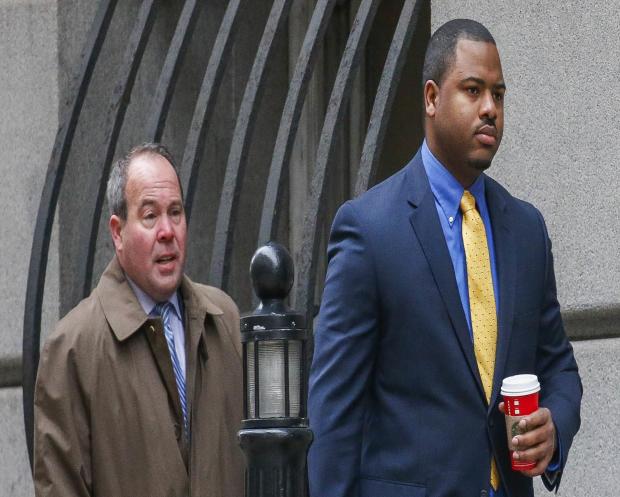Prosecutor: Officer on trial failed to help Freddie Gray
BALTIMORE -- Opening statements have begun in the trial for William Porter, one of six police officers charged in the death of Freddie Gray.
Prosecutor Michael Schatzow began his opening statement by recounting the day that Gray was arrested last April.
Prosecutors say Porter failed to render aid to Gray, who repeatedly asked for medical assistance.
"The defendant alone is on trial for what he did, or more importantly, what he did not do," Schatzow said.
Gray suffered a critical spine injury when he was handcuffed and shackled in a police transport van. Prosecutors also allege that Porter was negligent for failing to buckle Gray into a seatbelt.
Prosecutors say Porter is partially responsible for the young black man's death because he failed to render aid after Gray asked for medical attention and complained that he couldn't breathe.
Shatzow says Gray's neck was broken during the ride in the police van and implied that the injury occurred when the van slammed on its brakes.
CBS News' justice reporter Paula Reid reports that the prosecutor told the jury that Porter had been trained to use the van seat belts. But Porter still failed to use any of the five seat belts in the vehicle on Gray or to restrain him as required by department seat belt regulations.
Shatzow said the city paid extra to get those seat belts and "any one of which would have saved Mr. Gray's life."
Schatzow said during opening statements that Porter was present at five of six stops a transport van made after arresting Gray and could have easily pushed a button on his uniform to call for help.
Prosecutors say at one point, Porter asked Gray if he needed a medic, and Gray replied that he could not breathe and could not move from the floor of the van, where he had been placed head-first and in plastic handcuffs and leg shackles.
Instead of calling a medic, prosecutors say Porter picked Gray up from the floor and placed him in an upright position on the bench, and did not secure him in a seat belt.
Schatzow said Gray's injury occurred in a section of the spinal cord where the nerves control the chest and the diaphragm. He said such an injury would have impacted Gray's ability to breathe.
He says evidence will show that Porter "criminally neglected" his duty to keep Gray safe.
Attorneys for Porter disputed this and other claims made in the trial's opening statements, questioning how and when Gray's neck was broken in the back of a police van, and whether the young black man was really in need of medical attention when he first asked for it.
"You may hope finding him guilty will quell unrest," but Porter committed no crime, defense attorney Gary Proctor told jurors.
"Let's show Baltimore the whole damn system isn't guilty as hell," Proctor said, paraphrasing a chant used by protesters in the Black Lives Matter movement.
Earlier on Monday, the jury for Porter's trial was finalized. It is made up of eight women and four men, Reid previously reported. The breakdown of race and ages are as follows:
- 3 white women (all over the age of 50)
- 3 black men (all over the age of 50)
- 5 black women (range of ages)
- 1 white man
The four alternates are men.
The jury selection took place in an open court, the field eventually winnowed down from 47 prospective jurors. The pool included approximately 20 women. The racial makeup of the jury pool aligned closely with the city's demographics, with 20 white jurors and 27 black.
Both sides struck out several possibilities during the selection process.
The state's first "strike" was a young, white male. The defense's first strikes were two young black males and one young black female.
The last juror seated was a young, white male.
The jurors remained anonymous.
